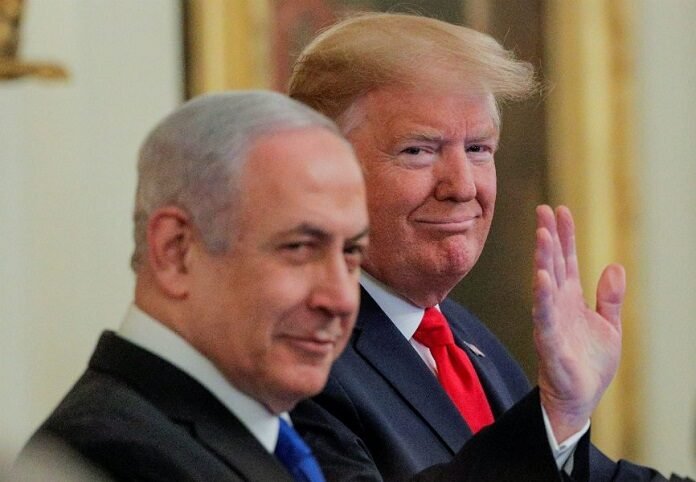
While researching about the Trump Administration’s Middle East peace which was confidently stated as “The deal of the Century” by President Trump in a joint press conference with Prime Minister Binyamin Netanyahu, I observed a trend in the academic journals that covered the event as biased.
According to a journal published by Efraim Inbar; president of the Jerusalem institute for Strategy and Security, Palestinians are not able to build their state. The article further suggests that Palestinians have produced a “failed state” since 1994. The implication is that there is no hope for peace in the Holy Land due to Palestinians refusal to adjust their behavior where change should come from through better leadership. Meanwhile another article describes the deal as a bitter pill to be swallowed by Palestinians. It further illustrates that “The Trump Administration’s much-awaited ‘Deal of the Century’ Middle East peace plan looks like a blatant attempt to wield an economic stick to browbeat the Palestinian leadership into forgoing their national aspirations”.
Depending on who is in question, the deal is interpreted differently. Peace to Prosperity: A Vision to Improve the Lives of the Palestinian and Israeli People, commonly known as the Trump peace plan or Trump’s deal of the Century is a plan rolled out by the Trump Administration to resolve the Israel-Palestine conflict. It is a two part plan that has the economic plan and political plan that were set to accomplish different goals toward peace in the region. It has been rejected by the Palestinian government citing bias toward Israel’s needs. It is a controversial topic in politics that has a great deal of press coverage. Below is an analysis of two articles that viewed the event with different lenses.
Associated Press writer Mohammed Daraghmeh reported on the events that occurred in Ramallah and AP writer Fares Akram reported from Gaza City, Gaza Strip. The article highlights important parts of the plan stating that, “The plan would create a Palestinian state in parts of the West Bank, but would allow Israel to annex its settlements in the occupied territory.” According to the article, The Palestinian government cut all ties to the United States after it claimed Jerusalem as the capital of Israel. The article further describes the internal protests where Palestinian protesters clashed with Israeli forces in the outskirts of Ramallah. Additionally, it reports on the international response from the European Union and the United Nation.
Palestinian president Mahmoud Abbas is navigating the circumstances while meeting with his supporters in various Arab countries as well as Palestinian factions to ‘discuss a unified response to the plan.’ The theme for the article is consistent with reporting of the President’s itinerary as well as events that followed. Although the article only focuses on Palestine mostly due to the geographical location of the reporters, the article is nonpartisan and simply reporting on the events occurring.
Although some publications were dovish, there are some conservative publications like Reuters. They reported on how most Arabs are opposed to the deal even most prominent leaders, “spokesman for Abbas said later he had received calls from Saudi King Salman and Lebanese President Michel Aoun ‘supportive of the Palestinian position.’” The article implied that most Arab nations that agreed to the deal are heavily dependent on the U.S and are afraid of retaliation but passively support Palestine. Furthermore, the article highlights that most Egyptians were opposed to the deal but were afraid to voice their problem to President Abdel Fattah el-Sissi’s government, which has already “cracked down harshly on dissent.” The journal analyses the loyalty of Arab countries to Palestine.
In the nutshell therefore, I believe the Associated Press’ reporting is somewhat dovish. The way they chose to frame the deal is more liberal and factual based. It has logos and less ethos. Reuters falls in the conservative category. It has much more ethos. Given how differently the story was framed, I believe they garnered different reactions. The Associated Press reports more on facts whereas the Reuters article’s rhetoric is calling attention to what is happening in the Arab world. I felt it made a point to have the Israeli society at a high alert.
Author: Esther Umutoni
Works Cited
-Reuters Article
https://apnews.com/article/0dcb0179faf41e1870f35838058f4d18
-AP Article
Cook, J. (2019). The “Deal of the Century” Would Force Palestinians to Swallow a Bitter Pill. Washington Report on Middle East Affairs, 38(4), 1–7.
Inbar, E. (2019). What after the Deal of the Century? Palestine-Israel Journal of Politics, Economics & Culture, 24(1/2), 85–90.















